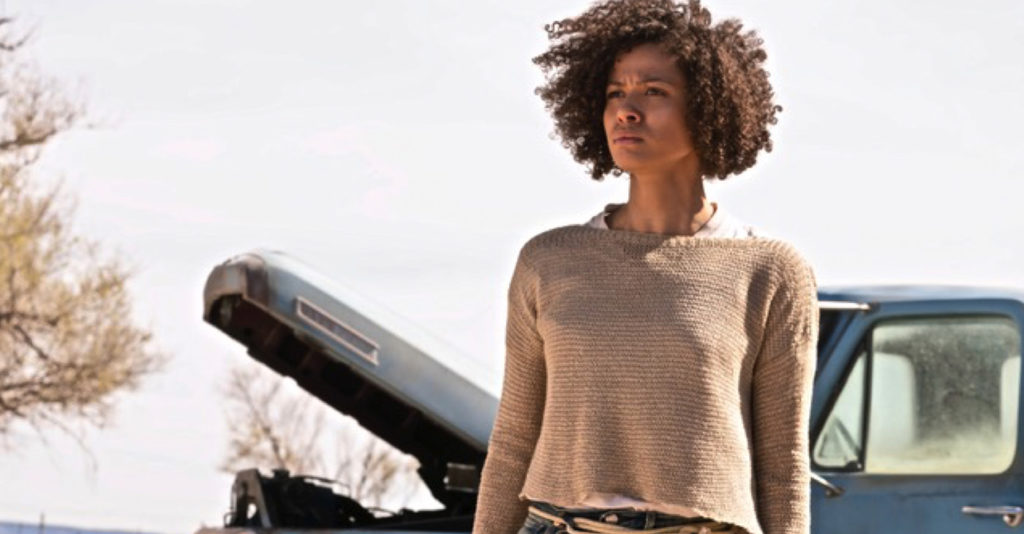Fast Color (2018)

Set sometime in a future in which natural resources like water have become scarce. Gugu Mbatha-Raw plays Ruth, a recovering drug addict on the run due to the fact that she just might be someone who possesses some sort of seizure that reveals an earth-shattering (literally) superpower that causes a shift in tectonic plates that never move, making her the target for experimentation from government scientists. Broke and desperate, she ends up returning to the rural home he ran away from when she was much younger, where her mother Bo and mostly estranged daughter Lila reside, who also have their own form of powers.
If Fast Color is a superhero origin story of sorts, it feels somewhat along the lines of M. Night Shyamalan’s Unbreakable, though even more low-key. If you inject that premise to a plotline that somewhat resembles Midnight Special if mixed with certain elements of The Fits, and you’ll come closer to what Julia Hart’s film has to offer.
Fast Color is more of an exploration into family dynamics than it is in the powers that the individuals possess. Some viewers will find it notable that this is a film in which black women possess gifts. Black superheroes are rare, and ones with black females headlining are limited to just the godawful Catwoman, starring Halle Berry, which wasn’t even written with race in mind. Julia Hart is a white woman, who co-wrote the film with her husband, Jordan Horowitz (also white), but didn’t envision a black woman in mind for the parts, just wanting the film to be about female empowerment.
However, as they were constructing the script, they happened to see Mbatha-Raw in Beyond the Lights and decided to rewrite the script with her in mind as the main character, not knowing if she would even be interested once completed. When Gugu read it, she, of course, felt that it was a part that was written just for her (because it was). From there, the story took on a more important message of empowerment among women of color.
Fast Color doesn’t have many opportunities for special effects, given its modest budget, but when they do occur, they are impressive. Rainbow-colored hues emerge as the women can manipulate and break down objects they set their minds to, then restore them exactly how they were before. Michael Fimognari’s cinematography captures the barren desert landscape is an asset, shot mostly in New Mexico, especially as it works in concert with Rob Simonsen’s sparse but connective score.
While there is much to admire within Fast Color, ultimately, it feels more like an interesting idea for a film than it succeeds at actually being an interesting film. Possibilities seem much more attractive than what plays out on the screen in its run time. While some will be hungry for a superhero film that suggests not only female empowerment but black female empowerment, if not for the fact that Hollywood has been derelict at providing such stories for over 100 years, this is only average storytelling at best, perhaps a revision or two away from finding something more compelling to draw us in to these characters and its narrative beyond the premise. For some viewers, that might be enough. However, as a reviewer of films, it’s my job to grade movies on their merit as stories, not in whether it tries to right the wrongs of the world.
It’s a close call, but, ultimately, this one’s not quite there for a feature film release, perhaps better relegated to be a very interesting short film, perhaps if it were just a couple of scenes of setup followed by the final third of the film. Fast Color may lack the typical sizzle and action-based excitement of typical superhero fare, and some viewers might grow a bit restless in its deliberate pacing, especially if the reveals within the film are surmised long before the time they tie into the main plot. It is a bit of an oddity and not wholly successful as entertainment, but despite its small-scale, downbeat delivery, it offers something to mull over when it’s over. If this were the pilot of a TV show, I’d likely stick around for the next episode to see where things develop. Too bad I don’t really review TV shows.
Qwipster’s rating: C+
MPAA Rated: PG-13 for a scene of violence and brief strong language
Running Time: 100 min.
Cast: Gugu Mbatha-Raw, Lorraine Toussaint, Saniyya Sidney, Christopher Denham, David Straithairn
Director: Julia Hart
Screenplay: Julia Hart, Jordan Horowitz
